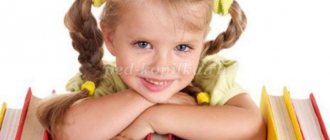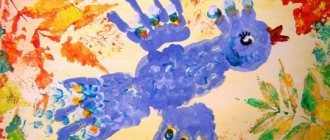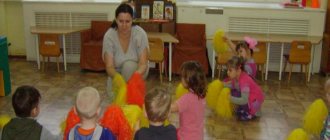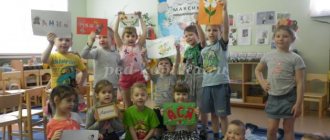Book week in kindergarten. Project for senior group
Passport of the pedagogical project: Project “Book Week”
Project: “Journey through Book Week with a stop at the Biblioteka station, for older children
Author: Efimova Alla Ivanovna, teacher of GBDOU No. 43, Kolpino St. Petersburg Description: The material will be useful and interesting for educators, junior and additional teachers education, parents, senior educators. Goal: Fostering love and respect for books. Forming children's interest in children's books through creative and cognitive activities. Objectives: - To introduce children to the types and purposes of books. — Clarify the role of writers, illustrators and designers. — Teach children to create a book with their own hands. — Develop creativity, imagination, fantasy. — Create conditions for the development of children’s creative abilities. — To form in children an idea of the role of books in human life. — Introduce children to different genres of books. — Give children knowledge about the role of the library. — Foster love and respect for books. - Encourage children to write. — Activate children’s speech, enrich and expand their vocabulary. — Involve parents in creative activities with their children. — Replenish the development environment with creative games “Library”, “Bookstore”.
Project “Book Week” Project type : short-term, Implementation period: 2 weeks. The presence of interdisciplinary connections: integration of educational areas - cognitive development, speech development, social and communicative development, artistic and aesthetic development, physical development. Type of project: artistic - creative. Project participants: teachers, older children, parents. Material and technical resources necessary to complete the project: - selection of methodological and fiction literature; - selection of visual material (illustrations, posters, photographs, books - encyclopedias; primers; alphabet books; fairy tales); — didactic games; - selection of cartoons; presentations on the topic; — an exhibition of books, drawings, an exhibition of creative works of parents and children. Necessary conditions for the implementation of the project: - interest of parents and children; — methodological developments. Relevance of this project. Recently, interest in the book has decreased significantly throughout the world. Books are increasingly being replaced by computers, electronic and digital media. Books become unclaimed, gather dust on shelves, and sit idle in libraries and stores. The book gradually fades into the background, reading ceases to be a process of educating one’s own soul, requiring a lot of work of the mind and heart, experience, and comprehension from a person. A reading person is a thinking person. This is why it is so important to instill in children a love of books starting from preschool age. Reading experience begins to develop in childhood. This is the age at which the ability to perceive a work of art with hearing, vision, touch, and imagination most clearly appears; sincerely, from the heart, to sympathize, to be indignant, to rejoice. With this project I would like to help parents and children find books that will help them acquire the joy of communication. Project methods: - gaming: didactic games; Board games; outdoor games; games - dramatization; plot-role-playing games; - verbal: reading and telling poems, fairy tales, riddles; conversation, conversation; looking at pictures; looking at books; encyclopedias; - practical: exercises (providing assistance), joint actions of the teacher and the child, - visual: showing presentations, using illustrations, paintings, photographs, showing cartoons; thematic exhibition. Three Question Method: What do we know? We know that there are books. We know that they are different. What do we want to know? How did the book come about? Where are the books kept? What kind of books are there? What is a library? And much, much more... Where and how will we find answers to our questions? Going to the library; Let's ask the adults for the answer; Let's read literature. Tasks for working with parents: - Enrich parents’ knowledge about the role of reading on the development of thought processes and creative abilities. — Increase the competence of parents on the topic of the project week. — Involve families to participate in the educational process on the basis of pedagogical cooperation. Expected result: - exhibition of children's works (modeling, appliqué, drawing, crafts...); - joint work of parents and children; - speech creativity of children; — didactic games and manuals; - GCD; - game - dramatization of children; - game - dramatization of parents. - name your favorite works; - can retell short texts, compose fairy tales, read poems expressively, and stage dramas independently; - know how to properly and carefully handle books: repair them, use bookmarks. - children learned about the importance of books in human life; - understand the concept of “Library”; - they know that they need to take care of the book; - know how to make their own books. Stages of the project: Before the “Book Week”, a developmental environment was created in the group. Exhibitions of books were organized on the following topics: “Smart Books”, “Little Books”, “Fairy Tales”, “My Favorite Book”, and a conversation was held about the upcoming holiday.
Children and parents were given homework: - reread their favorite books, - make illustrations for the fairy tale “Flower - Seven Flowers”. Collaborative work between children and parents. Stage 1 – preparatory (term 03/19/2015 – 04/03/2015). Setting goals and objectives, determining directions, objects and methods, preliminary work with children and parents, choosing equipment and materials. Survey of children “My favorite book”, survey of parents “Introducing a child to fiction”, identification of the problem. Processing the information received, selecting visual and gaming material. Studying methodological literature, developing a plan for joint activities. Objectives: - determine children’s current knowledge about books; - arouse interest in solving the problem. Forms of organizing work at stage 1: - planning project activities on the topic “Books. Library" based on methodological literature; — selection of methodological and fiction literature; - selection of didactic, mobile, sedentary; — drawing up a plan for interaction with parents and children. Stage 2 – practical. Finding answers to the questions posed in different ways, through the practical activities of children. Implementation of a plan of joint activities through the integration of different types of children's activities. Tasks: - creating a problem situation; - develop expressive speech; — develop cognitive abilities in children in the process of joint theatrical activities; — fill a corner of the book with materials on the topic of the project; - cultivate accuracy when working with a book. Forms of organization of work stage 2: - Work with children (organization of educational activities, organization of motor mode) Forms of work with children. Thematic conversations: - Situational conversation: “Do I need to take care of the book?” — Conversation: “What does a book consist of?” — Conversation on the topic “What is a library?”; — Conversation “The book is our friend.” — Conversation “I want to know everything!” - Conversation “HISTORY OF THE BOOK” (Teacher’s story about the development of writing with illustrations shown - clay tablets, scrolls, papyrus, parchment, birch bark, handwritten books, early printers, printing press). — Emotional speech warm-up “PROBERDS.” (Children pronounce proverbs about books with different intonations: cheerful, questioning, surprised, affirmative). — Acquaintance with the work of K.I. Chukovsky. — Examination of illustrations to the works of K.I. Chukovsky. — Display of the quiz presentation “Guess the Fairy Tale.” — Poll of children: “My favorite book.” Making a homemade book theme: “Spring is coming, spring is making way”; “Flower - seven-flowered” Introduction to proverbs: A spoken word will be forgotten, but a word written in a book will be remembered. From time immemorial, a book has raised a person. He who reads knows a lot Reading fiction: Reading the poem “Doctor Aibolit” using sound effects. "Fly Tsokotukha". "Flower - seven flowers." Russian folk tales, poems, stories, studied poems, encyclopedias. Watching the cartoon “Lessons from Aunt Owl. Baby's ABC" Listening to fairy-tale-themed songs. Artistically productive activities: - Making invitation cards for the fairy tale: “Teremok in a new way”;
— modeling “My favorite fairy tale hero”; — application “Bookmark for books”;
— drawing “My favorite book characters”; — drawing “Cover of your favorite book.” Theatrical activity: Game – dramatization “Tsapping fly”
Intellectual quiz game “Journey to the land of fairy tales” Consultations for parents: “How to teach a child to love books”, “Reading aloud to a child”, “So that a child loves to read. Advice from psychologist V.S. Yurkevich,” Questioning: “What books do they read at home.” Questioning: “Introducing a child to fiction”, Selection of children's works: - “Teremok”; - "Fly Tsokotukha"; - “Flower - seven-flowered.” Didactic games: “Collect a fairy tale”, “Finish the sentence”, “Say a word”. “Tell your favorite fairy tale”, cut-out pictures, puzzles “My favorite fairy tales”, “How to behave with a sick person?”; Fold the picture” game “Which fairy tale is the hero from?”; Design of the exhibition of children's encyclopedias "The smartest books" Role-playing games: "Library", "Bookstore" Construction using mathematical sets: "Assembling a bookshelf, cabinet"; from the constructor: “Building a library.” Outdoor games: “Confusion.” "Who is faster". “Find and remain silent.” “We are funny guys”; Repair of “sick” books in the book corner “Knizhkina Hospital” Travel through the exhibition “Magic Tales” - examination of books that differ in content, design, focus. Stage 3 – generalizing (final). Summarizing the results of work in a game form, analyzing them, consolidating the acquired knowledge, formulating conclusions. The best works of children, photographic materials and the final event for the project week will be included in the work experience. Exit to the library. Objectives: - develop creative abilities; -develop interest in reading books; — develop the ability to analyze, generalize and draw simple conclusions; - develop observation and curiosity, cognitive activity - cultivate independence in various types of activities. During the implementation of the Book Week project, the expected results were achieved: - As a result of the project, children became acquainted with the works of children's writers. — Children learned to recognize writers and poets in reproductions and photographs. — The children met children’s book illustrators. — Thematic exhibitions were organized for children. — The children learned how to repair books. — The children created creative works based on the works they read. — The children watched performances based on the works they had read. — Parents of pupils got acquainted with information on nurturing a love of reading. — We made a trip to the library.
Project prospects: In the future we plan to continue the work we started.
We recommend watching:
Project in kindergarten for older preschoolers 5-7 years old on legal topics Project in the senior group of kindergarten Project in the senior group on the topic “Trees and shrubs in spring” Project in the senior and preparatory group of the kindergarten
Similar articles:
Project for children of the senior group “Our cheerful garden”
Thematic week “The book is my favorite friend”
- June 21, 2017
International and All-Russian competitions
All-Russian competition of pedagogical excellence “Methodological piggy bank of a kindergarten teacher”
Relevance
The Federal State Educational Standard for Education indicates the need for children to become acquainted “with book culture, children’s literature, and to understand by ear the texts of various genres of children’s literature.” (FSES BEFORE clause 2.6) A child’s encounter with a book is completely determined by an adult, from the choice of text to read to the duration of communication with the book. Taste, interest in a work, its interpretation, the ability to navigate the circle of children's reading, the creation of a reading system - all this is in the power of an adult. The attitude of the child to the reading process also depends on the attitudes of the adult.
Modern children increasingly spend their free time playing computer games, watching TV shows and reading books less and less.
Thus, a contradiction arises: on the one hand, it is important and necessary to develop children’s interest in reading books, but on the other hand, there is no targeted, systematic work to introduce children to book culture in the families of pupils. To overcome the contradiction, a thematic week was developed and carried out in the senior group “The book is my beloved friend.”
Goals: introducing children to book culture, attracting the attention of parents to the problem of using children's books.
Tasks:
1. Prepare methodological material and a work plan for the project. 2. Develop and conduct events on the topic. 3. Analyze the effectiveness of the work done.
Providing a thematic week:
— methodological: methodological developments by Ushakova O.S., Gavrish N.V.
— diagnostic and didactic:
- questionnaire for children “Me and the Book”;
- didactic games: “Fairy-tale heroes” (lotto), “Compose a fairy tale” (cut-out pictures), “Sunshine”, “Journey through fairy tales” (adventure game), etc.;
- presentations “How does a book appear?”, “Who makes a book”;
— logistical:
- books that differ in content and design;
- presentations “History of Book Creation”, “Who Creates Books and How”;
- materials for creative activities (including a selection of old magazines and newspapers for cutting out), material for repairing books;
- attributes for role-playing games: “Library”, “Bookstore”, “Printing”, for theatrical activities;
- cards with proverbs, sayings and riddles on the topic, selection of poems;
- illustrations for literary works, reproductions of paintings of the fairy-tale genre, portraits of writers.
Expected result: increasing children's interest in the book.
Thematic week “The book is my favorite friend”
MAGAZINE Preschooler.RF
Project “Book Week” in the senior group of preschool age (from 5 to 6 years old)Compiled by: Educator - Mashkina G. M. 2021 Municipal budgetary preschool educational institution "Kindergarten of the village of Alatorka" of the municipal district of Iglinsky district of the Republic of Bashkortostan.
Relevance
The problem of reading is now very relevant in our country.
How to introduce a child to reading? A book should enter a child’s world as early as possible, enrich this world, make it interesting, full of extraordinary discoveries. A child should love a book and reach for it. Books have a special charm; books give us pleasure, they talk to us, give us good advice, they become living friends for us.
The urgency of solving this problem is obvious. To raise a reader in a child, an adult must himself show interest in a book, understand its role in a person’s life, know the books recommended for preschool children, be able to have an interesting conversation with children and help in analyzing the work. Children like to listen to fairy tales, poems, stories, but not everyone knows who the author of these works is. Many parents do not pay enough attention to this. At this time, there is a superficial interest of parents in introducing children to fiction and their authors. Many people replace books with cartoons and a computer.
This educational project is aimed at introducing children to books, knowledge of authors, illustrators for the development of cognitive and emotional activity of children
Goal: to introduce children to books using various forms and methods of working with literary works to develop their cognitive and emotional activity.
Objectives: - introduce children to children's writers and poets;
- increase children's interest in literary works through various activities
- to cultivate children’s desire to constantly communicate with books and treat them with care
- help broaden children's horizons
- increase the rating of the book in organizing leisure time for preschool children and stimulate the desire for constant communication with the book
- promote joint creativity between children and parents in promoting family reading.
Type, type of project: short-term, creative pedagogical, artistic and speech.
Project duration: 1 week – November 11-15, 2021
Age of children: senior group (children 5-6 years old)
Preliminary work with children:
- themed group room design
- replenishing the book corner with materials dedicated to book week
- drawing characters from your favorite fairy tales
- reading children's fairy tales, stories, poems
- selection of portraits of poets and writers
Forms of working with children.
- thematic conversations:
- situational conversation
- screening of the presentation “The history of the book”
- children's survey: “My favorite book” .
- reading the works of the authors being studied
- watching cartoons
- modeling “My favorite fairy tale hero”
- application “Bookmark for books”
- drawing “My favorite book characters”
Forms of work with parents:
- replenishing the group library with children's books from the home library.
- consultation for parents “How to teach a child to love books” , “Advice for parents” .
- recommendations for parents “How to foster a love and interest in books”
- individual conversation “What books do you read to your children at home”
- making a craft or drawing on the theme “My favorite book character” or “publishing” your own little book on any topic
Expected results:
- creating the necessary conditions in a kindergarten, group, family to familiarize preschoolers with works of fiction.
- children will get acquainted with children's writers and poets, and will distinguish between genres of works of art.
- interest in literary works will increase through various types of activities (drawing, modeling, didactic games)
- Children will develop a desire to constantly communicate with books and take good care of the book.
- active participation of parents in the implementation of the project, parents’ understanding of the importance of family reading.
- The significance of the Book Week is that thanks to the project
The interaction of preschool educational institutions has expanded, new directions have emerged in joint cooperation with the family to introduce children to the wonderful world of literature.
Project stages:
The preparatory stage is to select children's and methodological literature on the topic of the project, illustrations, portraits, photographs of the authors, didactic games, attributes, etc.
Conduct a conversation with parents “What books do you read to your children at home?”
Before the Book Week, a developmental environment was created in the group. — every day there was an exhibition of books on the topic of the day;
a long-term action plan has been drawn up
Children and parents were given homework:
- reread your favorite books
- collect unnecessary books, magazines, newspapers at home and from friends.
The main stage is to implement the long-term plan.
The generalizing stage is to summarize the material and organize an exhibition of books.
Project product: book exhibition, make crafts and drawings with your parents on the theme “My favorite book character” or
“publish” your own little book on any topic.
Result of the project:
- During the week, the children got acquainted with the history of the book
- As a result of the project, children became acquainted with the work of children's writers and children's book illustrators.
- Thematic book exhibitions were organized daily for children.
- children created creative works based on the works they read.
- children learned to recognize writers and poets in reproductions and photographs.
- The children were left with good impressions, their vocabulary was enriched, and their horizons were broadened.
Guidelines for parents
once again, convinced them that home reading or a bedtime story is an integral part of a child’s emotional and speech development.
| Next > |







